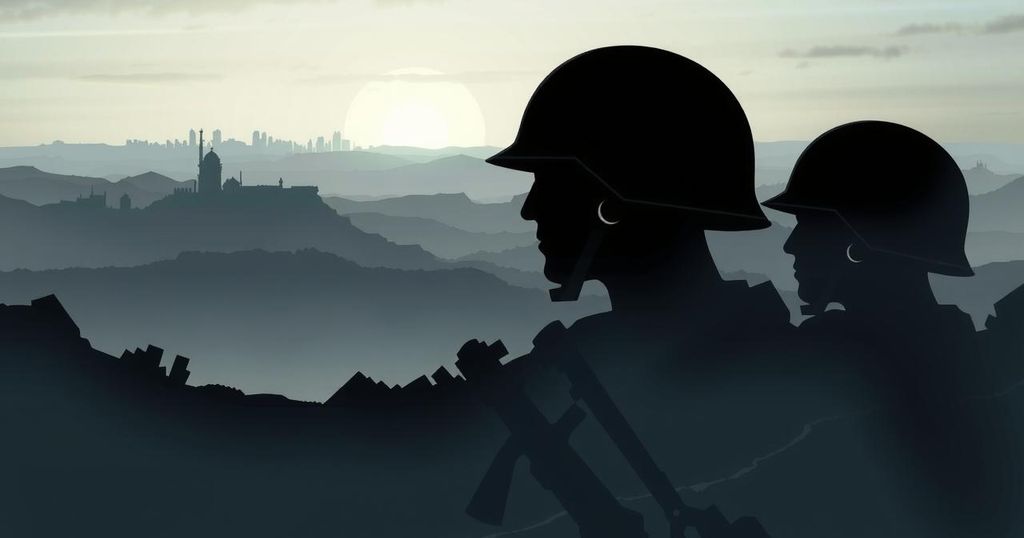The article reflects on the lasting impact of the 1993 Battle of Mogadishu in Somalia, highlighting narratives from individuals affected by the conflict. As Netflix releases a documentary detailing these events, testimonies reveal the tragic consequences faced by Somali families, including loss and trauma resulting from the U.S. military actions. The importance of acknowledging these experiences and the call for reparations are emphasized in the discussions surrounding the battle.
The term “Black Hawk Down” is commonly associated with a 1993 U.S. military operation in Somalia that ended in disaster, resulting in the deaths of eighteen American soldiers and hundreds of Somalis. As Netflix releases a documentary about these events, the BBC spoke with Somalis impacted by the battle. Binti Ali Wardhere, then 24, recalls a peaceful Sunday that abruptly changed with the onset of violence as the U.S. targeted warlord Mohamed Farah Aideed, leading to chaos in Mogadishu, her hometown.
In 1992, U.S. troops were deployed to assist with humanitarian efforts due to a famine and civil unrest following the collapse of Somalia’s government. However, Aideed’s actions against UN peacekeepers garnered him military attention, shifting perceptions of American presence in the region. The operation on October 3 began based on intelligence about Aideed’s whereabouts, but it extended far beyond the planned 90 minutes, lasting 17 hours.
Binti’s first indication of danger came from overwhelming explosions. As she witnessed the fighting unfold from a rooftop, two U.S. Black Hawk helicopters were downed, prompting a rescue mission. Amidst the panic, Binti returned home only to be struck by an explosion that resulted in devastating personal losses, including the deaths of her husband and two sons, while her surviving family members were left injured.
Ahmed Mohamed Hassan, a cameraman known as Ahmed Five, was also present that day, capturing crucial footage of the events. He instinctively began documenting the chaos as the fighting intensified, highlighting the stark contrast from his previous experiences covering clan wars and famine. His footage would later emerge as the first reports to the world about the battle, influencing global perceptions of U.S. military policy in Africa.
Saida Omar Mohamud had just given birth when the violence erupted. U.S. soldiers commandeered her home as a makeshift hospital, treating wounded soldiers and creating lasting fear among civilians. In honor of the soldiers who impacted her life during this tumultuous day, Saida named her daughter Amina Rangers, reflecting the profound effect the conflict had on her family.
The Netflix documentary aims to present a comprehensive view of the conflict by incorporating firsthand accounts from Somalis. Ahmed emphasizes the importance of acknowledging both sides of the story, as many Somali families continue to endure unspoken trauma. However, Binti believes that merely sharing their story is insufficient; she insists the U.S. should acknowledge the devastation caused and compensate those affected.
The article discusses the aftermath and ongoing impacts of the Battle of Mogadishu, particularly focusing on how Somalis perceive the events following the U.S. military operation that aimed to capture a local warlord. It highlights personal testimonies from individuals directly affected, illuminating the human cost of the intervention. The release of a documentary by Netflix resurfaces these historical events, allowing Somalis a platform to voice their experiences and grievances related to the battle’s consequences, particularly regarding the lack of acknowledgment and compensation from American forces.
The Battle of Mogadishu remains a poignant and tragic chapter in Somali history, with its effects still felt decades later. Personal narratives from survivors underscore the complexity and devastation of the conflict, reflecting on loss and the remaining scars it left behind. The documentary aims to shed light on these experiences, emphasizing the necessity for recognition and accountability in discussions about U.S. military interventions in Africa.
Original Source: www.bbc.co.uk
